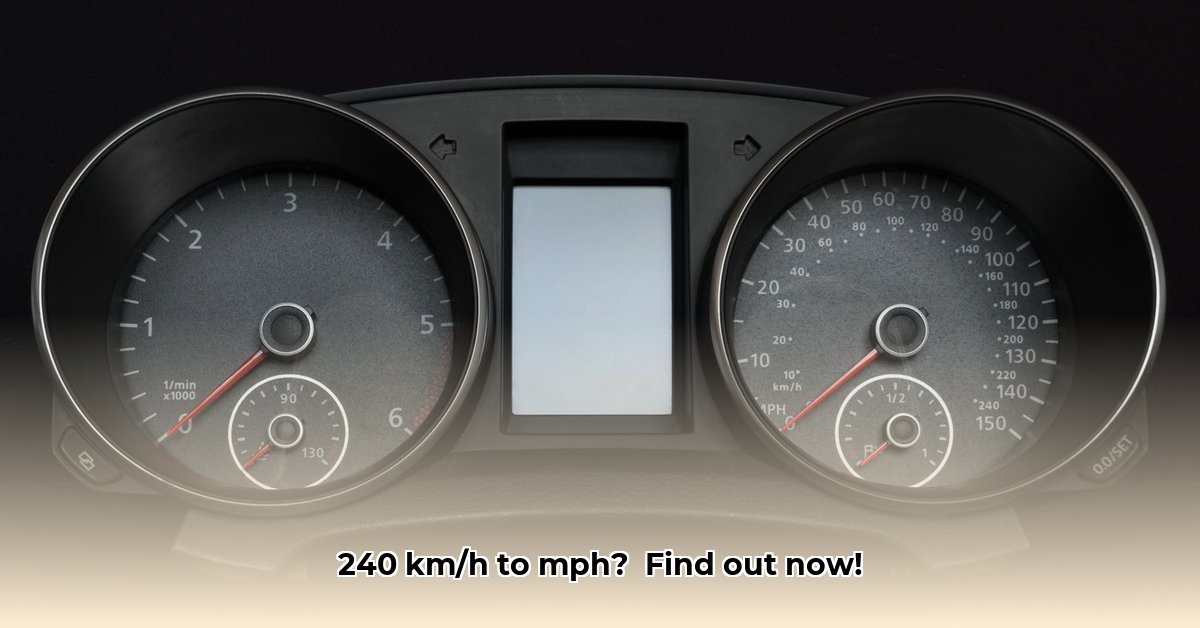Understanding the conversion between kilometers per hour (km/h) and miles per hour (mph) is crucial for various applications, from everyday travel to high-stakes scenarios like aviation and engineering. While a simple multiplication factor often suffices for general use, precision becomes paramount in specific fields where even minor discrepancies can have significant consequences. This guide delves into the nuances of converting 240 km/h to mph, exploring both basic and precise methods while highlighting the importance of accuracy in different contexts.
Decoding the Conversion: From Kilometers to Miles
Converting km/h to mph involves understanding the relationship between these two units of speed. One kilometer is equivalent to approximately 0.621371 miles. Thus, to convert a speed from km/h to mph, we multiply the km/h value by this conversion factor. However, the level of precision required dictates the specific conversion factor used.
The Simplified Approach: A Quick Conversion
For general purposes, multiplying 240 km/h by 0.621371 provides a reasonably accurate conversion:
240 km/h * 0.621371 ≈ 149.13 mph
This method suffices for everyday scenarios where pinpoint accuracy isn’t critical. However, in fields demanding higher precision, a more rigorous approach becomes necessary.
The Precision Method: Ensuring Accuracy in Critical Applications
When accuracy is paramount, utilizing a more precise conversion factor, such as 0.62137119223733, is essential. This extends the decimal places, minimizing potential rounding errors and ensuring a more accurate result:
240 km/h * 0.62137119223733 ≈ 149.1290861369592 mph
While the difference between the simplified and precise methods might appear negligible at 240 km/h, this discrepancy magnifies at higher speeds or over longer distances, potentially leading to significant deviations.
Real-World Implications: Where Precision Matters Most
The importance of accurate speed conversion extends beyond theoretical calculations, impacting various practical applications:
-
Aviation: In aviation, accurate speed calculations are fundamental for flight planning, navigation, and air traffic control. Even slight errors can have cumulative effects, impacting flight paths, fuel consumption, and overall safety. The difference between km/h and mph can mean the difference between a safe landing and a potential disaster.
-
Automotive Engineering: Precise speed conversions are critical in automotive design, performance testing, and ensuring compliance with safety regulations. Accurate speed data informs the design of braking systems, speedometers, and other critical components, directly influencing vehicle safety and performance.
-
Navigation and Mapping: GPS systems and mapping applications rely on accurate speed conversions to provide real-time information on estimated travel times and optimal routes. Accurate speed data is crucial for effective navigation and route optimization in real-world driving conditions.
-
Scientific Research: In scientific research, particularly in fields like physics and meteorology, precise speed conversions are essential for analyzing data, conducting experiments, and formulating accurate models. Precise measurements are the cornerstone of scientific accuracy and facilitate data interpretation.
Navigating the Conversion Landscape: Avoiding Common Pitfalls
While speed conversion might seem straightforward, several common errors can compromise accuracy:
-
Rounding Errors: Using a rounded conversion factor introduces errors, especially at high speeds or over long distances. Always use the most precise conversion factor available when accuracy is critical.
-
Unit Confusion: Mistaking units (e.g., using meters per second instead of kilometers per hour) can lead to substantial inaccuracies. Double-checking units before performing any conversion is crucial.
-
Over-Reliance on Online Converters: While convenient, online converters may employ rounded conversion factors, limiting their accuracy. Verify the precision of online tools or utilize a scientific calculator for critical conversions.
By understanding the intricacies of km/h to mph conversion and employing the appropriate level of precision, you can ensure accuracy in your calculations, regardless of the application. Whether you’re planning a road trip or designing a high-performance vehicle, accurate speed conversion plays a vital role in ensuring safety, efficiency, and reliable results.
- How to Fix Installation Stopped Xbox One Digital Download - February 15, 2026
- Resolve Game Not Installing on Xbox One Installation Problems - February 14, 2026
- Troubleshoot When Disc Installation Stopped on Xbox One - February 13, 2026
